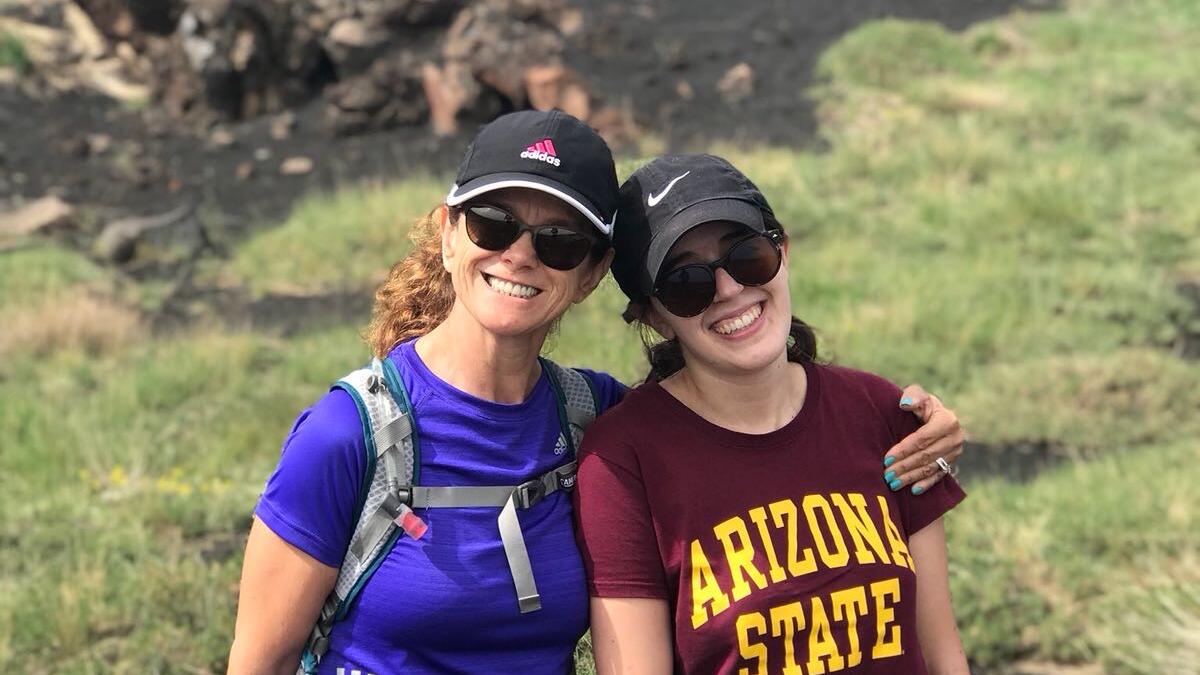New classes in the School of International Letters and Cultures shine light on sustainability

Principal Lecturer Chiara Dal Martello, left, stands with undergraduate student Bianca Navia at the top of Mt. Etna in Sicily, Italy, in June 2018.
Principles of sustainability are the focus of four courses that will be offered this spring through the Italian program in Arizona State University's School of International Letters and Cultures.
Most of the classes are new to ASU and they arose independently of one another, reflecting a broadening prioritization of sustainability across multiple academic disciplines. Though the courses are taught by faculty from the school's Italian program, they are open to students from a variety of majors and can satisfy undergraduate general studies requirements, such as global awareness and humanities, arts and design.
For example, students in “Natural Disasters: Environmental and Cultural Resilience” taught by Principal Lecturer Chiara Dal Martello will identify and analyze examples of Italian cultural resilience in the face of natural disasters. Students will learn from experts in numerous fields, from volcanology and disaster management to history and art, and examine a variety of texts, including scientific studies, personal narratives, films and newspaper articles.
“Currently, there is a lack of science and culture courses that highlight the connections between science and humanities,” said Dal Martello, noting that these two areas have overlapped to form new fields, such as environmental humanities. “Students need to observe and study these connections in a real-world context.”
The “Natural Disasters” course is the product of an innovative partnership between Dal Martello and Bianca Navia, a senior majoring in political science and global studies. Navia helped develop the course as part of her thesis project for Barrett, The Honors College. Navia and Dal Martello even spent two weeks conducting field work in Sicily in 2018.
In-depth student involvement is crucial to the planning and success of each of these classes. Another course titled “The Mediterranean Lifestyle in Italy” taught by Associate Professor Juliann Vitullo offers students the opportunity to study abroad in Sicily for a week after the conclusion of the spring semester as part of a “Global Intensive Experience.”
Vitullo said her course, which has previously been offered in several formats, caters to students studying food and health issues, as well as those who just want to appreciate the delicious cuisine of other cultures.
“Many students in our course also want to investigate the connections between healthier food practices, questions of social justice, and a sustainable future for our planet,” said Vitullo, who is also the interim director of the Humanities Lab. “A more sustainable future requires us to protect both bio- and cultural diversity. We need to protect not only the flora and fauna of different ecosystems, but also the place-based knowledge, practices, and languages of the peoples who have deep roots in those territories.”
The other two courses, “Italian Ecocinema,” taught by Assistant Professor Serena Ferrando, and “Sustainable Fashion,” co-taught by Senior Lecturer Enrico Minardi and Professor of Practice Dennita Sewell (who is based in the School of Art), are open to both undergraduate and graduate students.
In Minardi and Sewell’s Humanities Lab course, they take a step back as instructors to allow the students to tailor their learning experience to their individual interests, in what they call a nontraditional approach to the learning process.
Students become active learners and their goal is to imagine solutions to the problems the class is set to tackle — in this case, asking the question of how fashion can be sustainable, the two instructors said. Students research, create and propose new scenarios for a sustainable evolution of the fashion system.
This pedagogical sentiment is echoed by Ferrando, who invites students in all her classes to be enthusiastic and open to collaboration and creativity through experiential learning activities.
“I very much enjoy collaborating with my students and involving them in creative research projects,” she said. “In fact, one of my main objectives as an educator is to help them transition from students to independent learners and young scholars who can contribute to communities on campus and beyond.”
The School of International Letters and Cultures is excited to offer these innovative courses, which are part of a larger push to ecologize the school’s curriculum and to prepare students for the environmental and social challenges that lie ahead.
More Science and technology

ASU-led space telescope is ready to fly
The Star Planet Activity Research CubeSat, or SPARCS, a small space telescope that will monitor the flares and sunspot activity…

ASU at the heart of the state's revitalized microelectronics industry
A stronger local economy, more reliable technology, and a future where our computers and devices do the impossible: that’s the…

Breakthrough copper alloy achieves unprecedented high-temperature performance
A team of researchers from Arizona State University, the U.S. Army Research Laboratory, Lehigh University and Louisiana State…

